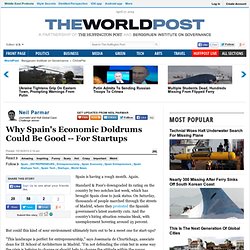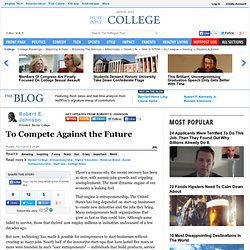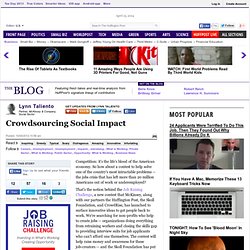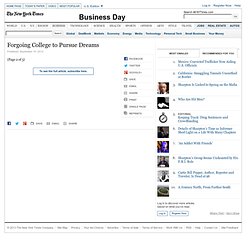

Smita Satiani: 5 Signs You May Be a Social Intrapreneur. The Jack-of-all-trades. The Connector. The Secret Change Agent. What do each of these individuals have in common? They are examples of a new type of corporate changemaker that is cropping up in organizations around the world known as a social intrapreneur. Contrary to their social entrepreneur counterparts -- individuals that use their passion and skills to start a new independent enterprise -- social intrapreneurs use the resources within the structure of their organization to create innovations that make a positive impact not only on their business but also on the world. Curious whether you and the work you are doing fall in this category? 1) You are curious. It is often said that defining the problem is half the solution. 2) You build coalitions. You have social capital and you use it wisely. 3) You have launched a new initiative, developed a new product, or established an innovative business model within your organization. 4) You are not satisfied with the status quo.
Neil Parmar: Why Spain's Economic Doldrums Could Be Good. Spain is having a rough month.

Again. Standard & Poor's downgraded its rating on the country by two notches last week, which has brought Spain close to junk status. On Saturday, thousands of people marched through the streets of Madrid, where they protested the Spanish government's latest austerity cuts. And the country's hiring situation remains bleak, with unemployment hovering around 25 percent. But could this kind of sour environment ultimately turn out to be a sweet one for start-ups? "This landscape is perfect for entrepreneurship," says Josemaria de Churtichaga, associate dean for IE School of Architecture in Madrid. Robert E. Johnson: To Compete Against the Future. There's a reason why the recent recovery has been so slow, with anemic jobs growth and crippling unemployment: The most dynamic engine of our economy is leaking fuel.

That engine is entrepreneurship. The United States has long depended on start-up businesses to create new industries and the jobs they bring. Many entrepreneurs built organizations that grew as fast as they could hire. Although some failed to survive, those that thrived now employ millions in industries undreamed of a few decades ago. But now, technology has made it possible for entrepreneurs to start businesses without creating so many jobs. The result is what Kauffman researcher E. The answer is simple: More entrepreneurs. But higher education cannot create a new class of entrepreneur, one prepared to compete against the future, if it remains the way it is now. Our institutions of learning, built on a model that is centuries old, have long prepared students for careers in industry. Consider the Internet. Entrepreneurs in Latin America: The lure of Chilecon Valley. Lynn Taliento: Crowdsourcing Social Impact. Competition: it's the life's blood of the American economy.

So how about a contest to help solve one of the country's most intractable problems -- the jobs crisis that has left more than 20 million Americans out of work or underemployed? That's the notion behind the Job Raising Challenge, a new contest that McKinsey, along with our partners the Huffington Post, the Skoll Foundation, and CrowdRise, has launched to surface innovative ideas to get people back to work. We're searching for non-profits who help to create jobs -- organizations doing everything from retraining workers and closing the skills gap to providing interview suits for job applicants who can't afford one themselves.
The contest will help raise money and awareness for these job-creators -- and the Skoll Foundation has put up $250,000 to reward the winning organizations. Since we published that report, a number of important shifts have occurred in the sector. In some ways this is a return to roots. The Thiel Fellows, Forgoing College to Pursue Dreams. Family Photo Laura Deming, left, at age 6 with her grandmother, whose neuromuscular problems have now inspired Laura to work on anti-aging technology.

J. Adam Huggins for The New York Times Christopher Olah, 19, with a 3-D printer and printed objects he designed. “Families of Olympic-caliber athletes make these kinds of sacrifices all the time,” says Tabitha Deming, Laura’s mother. ”When we lived nearby in Boston, we were lucky to see her once a month. John Deming, Laura’s father, graduated from Brandeis University at the age of 35 but says he disdains formal education at every level. “I can’t think of a worse environment than school if you want your kids to learn how to make decisions, manage risk and take responsibility for their choices,” Mr.
His daughter’s quest to slow aging was spurred by her maternal grandmother, Bertie Deming, 85, who began having neuromuscular problems a decade ago. “I’m looking for therapies that target aging damage and slow or reverse it,” she says. Now Mr.